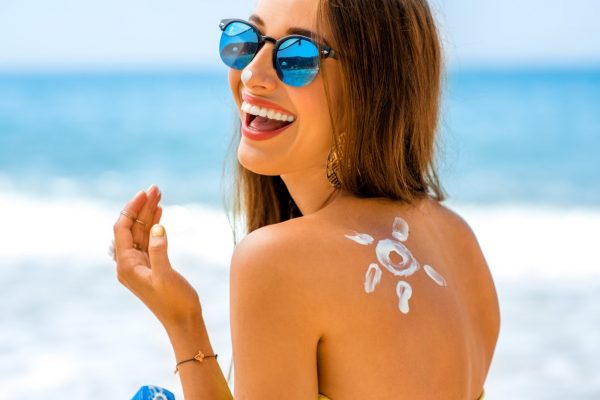Acne and Summer: Natural Enemies or Friends?

Acne and Summer: Natural Enemies or Friends?
Posted on Fri Jul 10, 2020
Summer is here and, with lockdown measures easing and the promise of good weather to come, we wanted to look into the relationship between warm weather and acne. Is summer bad news for your skin, or should you welcome warmer weather with warm wishes?
To find out more, we spoke to Dr Hiba Injibar, founder and Consultant Dermatologist at Dermasurge Clinic on Harley Street.
How does summer impact on acne?
‘The first thing to note is that acne is not seasonal, i.e. it does not change with the weather,’ says Dr Injibar.
‘At a basic level, the body being warmer or colder does very little to impact acne. However, the lifestyle changes that accompany the warmer seasons can be conducive to worse skin.’
Socialising and acne
During the summer months, (lockdown-allowing), socialising is much more prevalent as we take advantage of the warmer weather to travel to see friends and family, to go abroad or simply to get out and about.
‘The increased socialising means that we tend to wear more makeup,’ says Dr Injibar, ‘and I see more patients who are concerned about their skin during the summer months than in the winter.
‘We tend to wear makeup more often, or more of it, and unless this is oil-free then it will have an impact on anyone’s skin. I often tell patients to wear less makeup, and if it’s a habit they can’t break, I recommend oil-free products.’
Does the sun affect it?
‘Not really – in fact, the sun can clear up quite severe acne!’ says Dr Injibar.
‘The difficulty with activities like sunbathing is that we need to wear sunscreen, which is inherently occlusive. That means your pores are blocked, which is bad for the skin.’
Dr Injibar recommended using oil-free sunscreen, like the Eucerin Oil Control range.
But occlusion isn’t your only enemy during a sunbathing session!
‘The other problem with warm weather is that our diet tends to get a bit worse, especially if we’re on holiday and not worrying about what we eat as much as usual,’ says Dr Injibar.
‘If you’re on holiday abroad, you might eat more unhealthy foods like dairy and sugar, which are proven to impact acne.’
How about alcohol?
‘Alcohol doesn’t directly impact your skin in terms of acne. However, I often see patients with rosacea, which is often mistaken for it. Rosacea can look very similar to acne, and its causes include alcohol, spicy food, dairy and caffeine.’
Can chlorine affect acne?
‘Chlorine, like all chemicals, is a potential irritant, which can be worsened by any acne medicine you are using. Although chlorine won’t affect your acne directly, it might be uncomfortable to swim in a pool that uses chlorine if you’re on acne treatments,’ says Dr Injibar.
And how about face masks?
‘I assume you mean clinical face masks!’ says Dr Injibar. ‘Yes, this is a rising problem being dubbed ‘maskne’, which is when acne appears around the nose and mouth, where a face mask has rubbed against the skin and created acne.
TL;DR
Whilst warm weather doesn’t directly affect acne, the decisions we make during the warmer months, such as wearing suncream, eating less healthily and wearing makeup more often can affect flare-ups.
If you want to see a specialist, Dr Hiba Injibar treats patients at her Harley Street clinic and would be pleased to see you there.
CPD webinar on acne
If you’re a healthcare practitioner, you might be interested in Dr Injibar’s upcoming CPD talk, entitled “Webinar: Adolescent & Adult Acne – Myths, Management & Maintenance” on Monday 10th August. We’ll be discussing the pathophysiology of acne for each patient; whether it is hormonal, diet-related or otherwise, and the differences in adolescents and adults.
Share this article
Most Recent
Posted on Thu Jul 3, 2025
How Long Does A Shoulder MRI Take?
Posted on Thu Jul 3, 2025
Posted on Tue Jul 1, 2025
Stay up to date
If you’re interested in keeping up with what we’re doing, just leave your email address here and we’ll send you periodic newsletters and other updates.






